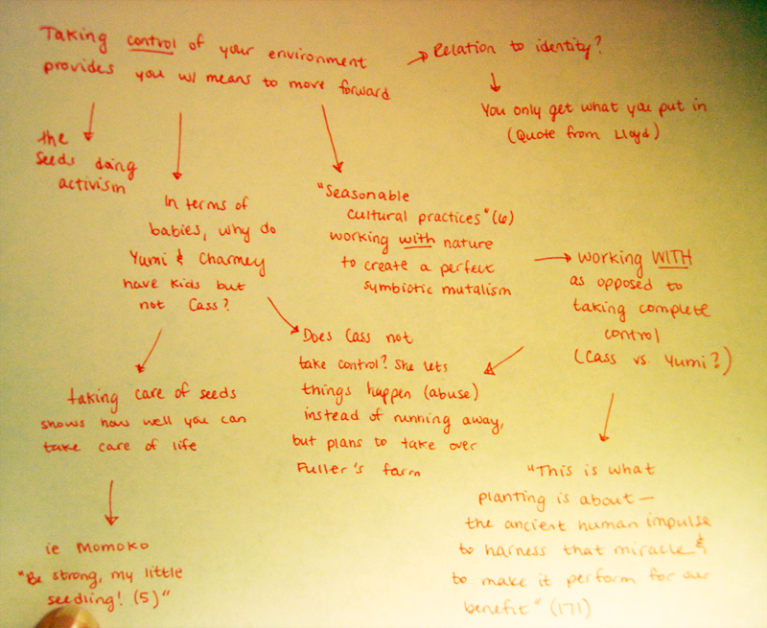October 24, 2014 - 14:45

(sorry if it's a bit difficult to read the photo!) Ok so the general direction I was thinking of taking this in is talking about, obviously, the relation of identity vs environment. In a sort of "you are what you eat" kind of deal, I think that the book says that you only get what you put into things. For instance, Yumi took her life into her own hands by running away, and the Seeds of Resistance are trying to actively destroy GMOs. That's pretty generic on its own, so a step further might take to taking control of the environment as a means of instigating. Thinking along these lines, I started contrasting that "taking control" with a more passive "working with what you have". That part can be shown via Yumi & Cass, and their reactions to their parents (running away vs staying).
...However, in the book, it looks like the opposite of what you expect happens. Like, Yumi is the one who (in my opinion) is more the same person, even after she runs away. Cass, however, does change. Does this mean that working passively is actually what works?
Relevant quotes—
"Fuller Farms seemed living proof to us all that with the cooperation of God and science, and the diligent application of seasonable cultural practices, man could work in harmony with nature to create a relationship of perfect symbiotic mutualism (6)."
"Of course, this is what planting is about—the ancient human impulse to harness that miracle and to make it perform for our benefit. To emulate the divine author and tease forth a new crop of stories from the earth (171)."
(As Lloyd falls down in the dirt) "The smell of the soil tickled his nose and felt cool against his forehead. It was his soil, built up carefully with generous rotations of nitrogen fixing crops, year after year. Recycling nutrients. Never taking out more than you gave back. So different from the way they farmed potatoes now (254)."


Comments
comment
Submitted by zara on October 27, 2014 - 19:12 Permalink
The contrast between Cass and Yumi, working with what you have and taking control, is a great one. Further, the idea of working passively is a good idea to bring up, and brings up a lot of different connections; you could even talk about Yumi’s kids and how they react to things.
The claim is that you only get out what you put into things.
“the opposite of what you expect happens?”
Submitted by Anne Dalke on October 27, 2014 - 20:52 Permalink
aquato--
I LOVE your visuals—the web, like the free-associating that is your first draft, gives a dynamic sense of your thinking. I think your keynote here is ‘control’ (how much can we ‘control’ who we become? How much can we ‘control’ the environment? How counterproductive is it, to try and control outcomes in an open, inherently unpredictable system—whether it be psychological or ecological?).
There’s an essay that Jody and I often reference in the talking and writing we do about our own directed but ultimately uncontrollable eco-pedagogy; it’s C.S. Holling and Gary K. Meffe’s “Command and Control and the Pathology of Natural Resource Management.” Conservation Biology 10, 2 (April 1996): 328-337. Holling and Meffe argue that any attempt to manage an ecosystem “should facilitate existing processes and variability rather than changing or controlling them….Prescriptions and cookbook approaches generally should be avoided….the systems with which we work are idiosyncratic and endlessly varied. No single, detailed prescription can be of much use” (p. 334). In another essay published the same year, “Surprise for science, resilience for ecosystems, and incentives for People,” Ecological applications 6, 3, 733-735), Holling underscores the “dynamic, inherently uncertain” nature of ecosystems, which have “multiple potential futures” (p. 734).
So I’m wondering if a larger framing around questions of control—or its impossibility—might take this paper up one level of abstraction….?